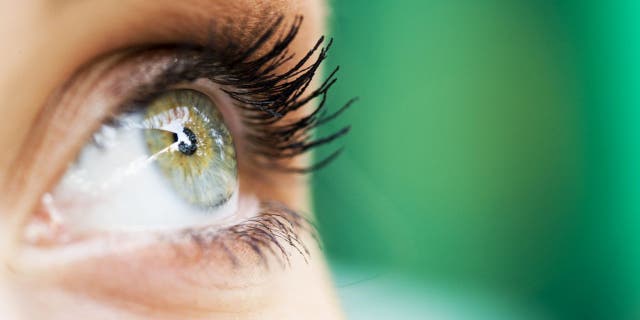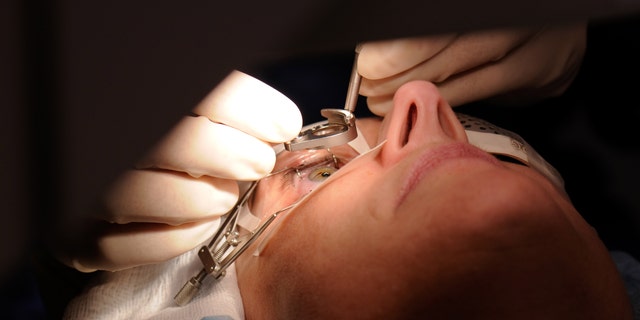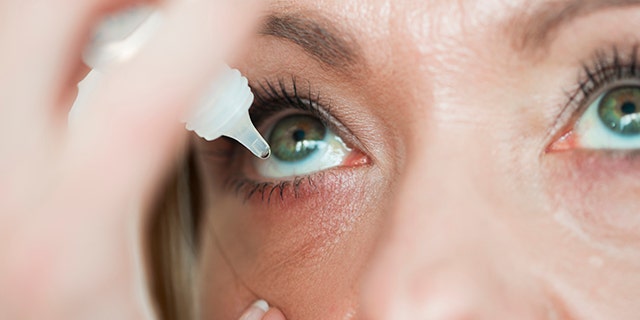Patients who had LASIK eye vision corrective surgery — or Laser-Assisted In Situ Keratomileusis — have been weighing in on the recent draft guidelines from the Food and Drug Administration (FDA) connected to the surgery.
The FDA's draft has been causing controversy among eye experts — and is also creating mixed reactions from patients.
The draft is a 25-page report that details how patients need to be better informed — ahead of the surgery — of the risks of potential side effects from the LASIK procedure.
FDA WARNS THAT LASIK SURGERY PATIENTS NEED TO BE BETTER INFORMED OF RISKS BEFORE EYE PROCEDURE
The FDA's guidance states that patients considering LASIKThe surgery should be given a "decision checklist" that describes the procedure.
Patients should also receive a list of potential side effects that may result from the surgery. These side effects may include dry eyes, difficulty driving at night, double vision, seeing halos around objects, having persistent eye pain in some cases, and having a need for glasses, the FDA said in the same paper.

The FDA's guidance states that patients considering LASIKeye surgery should be given a "decision checklist" that describes the procedure.
(iStock)
Boris A. of Los Angeles, California, told Fox News Digital this week that after his LASIK procedure, his "eyes were burning for a whole month, and [he] had to use eyedrops daily and couldn't stand the sunlight or anything [of] white colour."
The California resident said if he could go back in time, he never would have had the procedure done.
EYE SPY A BIG PROBLEM: CALIFORNIA DOCTOR REMOVES 23 CONTACT LENSES FROM ONE WOMAN'S EYE
At first, he said, the surgery seemed to work.
"At that time [after the surgery]yes … I was able to see clearly during those 15 years."
He said that eventually, however, he "lost my 20/20 [vision], I'm back to using prescription glasses."

One California resident told Fox News Digital that if he could go back in time, he would never have had the LASIK procedure done.
(iStock)
A typical day for him, he said, involves inserting several eyedrops twice a day into his eye, due to dry eye. (His last name is omitted for patient privacy.)
When asked by Fox News Digital if he felt he was fully informed of potential side effects before the surgery, he answered simply, "No."
'Benefits and risks of surgery'
The FDA in July presented the draft guidelines, which suggested the content that should be included on patient labeling information for LASIK devices.
"It is important for people considering LASIK to have clear and understandable information on the benefits and risks of the surgery to help inform their decision on whether to get LASIK," the FDA said in the draft guidance.
The FDA also accepted comments from the public, individuals and groups associated with eye care, including professionals in the field.
"These recommendations, when finalized, are intended to help ensure physicians can share and patients can understand information about the benefits and risks of LASIK devices," the agency also said.
"Further," the agency noted, "this information is intended to enhance, but not replace, the physician-patient discussion of the benefits and risks of LASIK devices that may uniquely pertain to individual patients."
BLIND MICHIGAN JUDGE DRIVES RACE CAR — AND INSPIRES OTHERS TO FOLLOW THEIR DREAMS, TOO
The FDA also accepted comments from the public, individuals and groups associated with eye care, including professionals in the field.
Over 600 comments were accepted through November 2022, some positive and some negative, regarding the draft guidelines.
Patients shared their experiences in the FDA comments section — and many of the comments posted there appeared to strike the same notes that Alegria of Los Angeles shared.

"It is important for people considering LASIK to have clear and understandable information on the benefits and risks of the surgery to help inform their decision on whether to get LASIK," the FDA said in its draft guidance.
(iStock)
One individual posted this comment: "LASIK ruined my life. Please do something about this. Our society needs to know the truth."
The person added, "My eyes do not see well at night after LASIK. I have massive ghosting, halos and starbursts. I had perfectly crisp, distortion-free vision with contacts and glasses prior to having LASIK done. I was only 26 at the time for LASIK. How sad!"
That same individual also felt there was a lack of information given at the time of procedure.
"My eyes do not see well at night after LASIK. I have massive ghosting, halos and starbursts."
"I was reassured that worst-case scenario … I would need glasses after LASIK. I was not told that LASIK [would] create vision problems that glasses and contacts could not correct."
SEE THE MOMENT THOUSANDS GO SILENT SO BLIND BASKETBALL PLAYER CAN HEAR HER SHOT
This same person added, "I have much-increased floaters in my eyes and sensitivity to light. I have spent thousands of dollars on my eyes post-LASIK to try to get my old vision back. I am wearing scleral contact lenses, which only help some."
Other patients, however, tout the benefits of the procedure.
'Haven't regretted my choice'
The goal of the procedure is to reduce a person's dependency on eyeglasses and contact lenses by the use of a type of laser to change the shape of the cornea (the covering of the front portion of the eye that refracts light), according to the FDA's website.
"My eye surgeon was very comforting during my procedure, letting me know exactly what was going on and talking me through it," said one patient in the comments section of the report.
![One person wrote in the comments section of the FDA's draft guidelines, "The only thing I regret is not having [the surgery] soon."](https://a57.foxnews.com/static.foxnews.com/foxnews.com/content/uploads/2020/10/640/320/Laser-Eye-Surgery-iStock.jpg?ve=1&tl=1)
One person wrote in the comments section of the FDA's draft guidelines, "The only thing I regret is not having [the surgery] sooner."
(iStock)
This person also wrote, "I haven't regretted my choice to have LASIK. The only thing I regret is not having it sooner. I woke up the next morning and immediately turned my TV on to see if I could see what was on TV ."
She wrote as well, "I went to lunch and kept asking my fiancé to quiz me on what someone's license plate or road sign said. I couldn't believe I could see without my glasses on or contacts in. Everything looked like it was in HD. I would have LASIK a million times over again if I could; it has seriously changed my life."
The procedure lasts about 30 minutes and is not typically covered by insurance.
The procedure lasts about 30 minutes and is not typically covered by insurance, health experts told Fox News Digital.
Concerns about informing patients about LASIK risks ahead of time were raised over a decade ago, according to the FDA website.
The federal agency said it issued a letter to eye care professionals back in May 2009, providing information regarding the promotion and advertising of FDA-approved lasers that are used during LASIK surgery.
'GREAT CONCERN': INVASIVE GROUP A STREP CASES SPIKING IN PARTS OF US — CDC IS INVESTIGATING
The FDA said that since then, it has received additional complaints that eye care professionals failed to inform patients of indications and the risks and limitations associated with LASIK procedures.
"The topics covered in the guidance document are all important for the informed consent process, but they are not presented with sufficient depth and nuance," Dr. Stephen McLeod, CEO of the American Academy of Ophthalmology, headquartered in San Francisco, said in a statement to Fox News Digital.

"Effective informed consent" ahead of surgery "is a process of shared information and decision-making that happens between the physician and the patient," said Dr. Stephen McLeod, CEO of the American Academy of Ophthalmology, in a statement to Fox News Digital.
"The academy believes that effective informed consent is a process of shared information and decision-making that happens between the physician and the patient," McLeod also said.
"A discussion of risks and benefits can sometimes seem abstract, and for it to be meaningful to an individual, [the details] must be interpreted and discussed specifically for that person—taking into account their unique features and needs," McLeod went on.
"They take the money without telling us the risk in the future," said one patient in Los Angeles.
"We are also concerned that there are several statements that are not well-supported by the latest evidence, and some that have actually been disproved," McLeod added.
Patients such as the man in Los Angeles, though, told Fox News Digital that the guidelines are necessary.
"Yes, to protect us—since they take the money without telling us the risk in the future," he said.
CLICK HERE TO SIGN UP FOR OUR HEALTH NEWSLETTER
The FDA issued its draft guidance in July 2022.
It accepted over 640 comments about the suggested draft guidelines from professionals, associations and individuals through Nov. 25, 2022.
The FDA told Fox News Digital that it will "consider the submitted comments while preparing the final documents."
CLICK HERE TO GET THE FOX NEWS APP
No established timeline was given as to when the final guidance will be issued.
Originally published at Source Health


